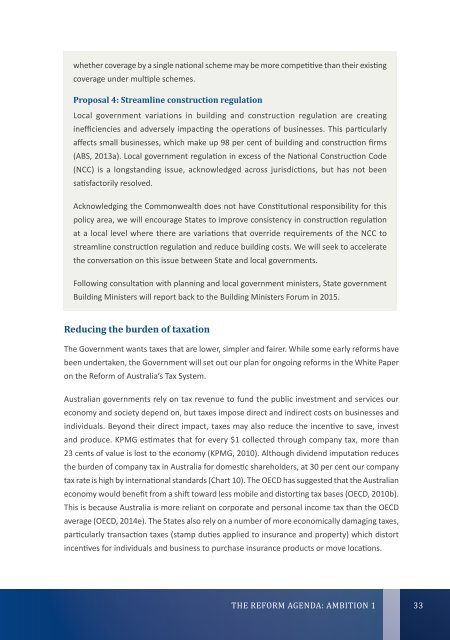Industry-Innovation-and-Competitiveness-Agenda
Industry-Innovation-and-Competitiveness-Agenda
Industry-Innovation-and-Competitiveness-Agenda
Create successful ePaper yourself
Turn your PDF publications into a flip-book with our unique Google optimized e-Paper software.
whether coverage by a single national scheme may be more competitive than their existing<br />
coverage under multiple schemes.<br />
Proposal 4: Streamline construction regulation<br />
Local government variations in building <strong>and</strong> construction regulation are creating<br />
inefficiencies <strong>and</strong> adversely impacting the operations of businesses. This particularly<br />
affects small businesses, which make up 98 per cent of building <strong>and</strong> construction firms<br />
(ABS, 2013a). Local government regulation in excess of the National Construction Code<br />
(NCC) is a longst<strong>and</strong>ing issue, acknowledged across jurisdictions, but has not been<br />
satisfactorily resolved.<br />
Acknowledging the Commonwealth does not have Constitutional responsibility for this<br />
policy area, we will encourage States to improve consistency in construction regulation<br />
at a local level where there are variations that override requirements of the NCC to<br />
streamline construction regulation <strong>and</strong> reduce building costs. We will seek to accelerate<br />
the conversation on this issue between State <strong>and</strong> local governments.<br />
Following consultation with planning <strong>and</strong> local government ministers, State government<br />
Building Ministers will report back to the Building Ministers Forum in 2015.<br />
Reducing the burden of taxation<br />
The Government wants taxes that are lower, simpler <strong>and</strong> fairer. While some early reforms have<br />
been undertaken, the Government will set out our plan for ongoing reforms in the White Paper<br />
on the Reform of Australia’s Tax System.<br />
Australian governments rely on tax revenue to fund the public investment <strong>and</strong> services our<br />
economy <strong>and</strong> society depend on, but taxes impose direct <strong>and</strong> indirect costs on businesses <strong>and</strong><br />
individuals. Beyond their direct impact, taxes may also reduce the incentive to save, invest<br />
<strong>and</strong> produce. KPMG estimates that for every $1 collected through company tax, more than<br />
23 cents of value is lost to the economy (KPMG, 2010). Although dividend imputation reduces<br />
the burden of company tax in Australia for domestic shareholders, at 30 per cent our company<br />
tax rate is high by international st<strong>and</strong>ards (Chart 10). The OECD has suggested that the Australian<br />
economy would benefit from a shift toward less mobile <strong>and</strong> distorting tax bases (OECD, 2010b).<br />
This is because Australia is more reliant on corporate <strong>and</strong> personal income tax than the OECD<br />
average (OECD, 2014e). The States also rely on a number of more economically damaging taxes,<br />
particularly transaction taxes (stamp duties applied to insurance <strong>and</strong> property) which distort<br />
incentives for individuals <strong>and</strong> business to purchase insurance products or move locations.<br />
<strong>Industry</strong> <strong>Innovation</strong> <strong>and</strong> <strong>Competitiveness</strong> <strong>Agenda</strong><br />
In<br />
Co<br />
TPO00007<br />
The Reform <strong>Agenda</strong>: Ambition 1<br />
33


